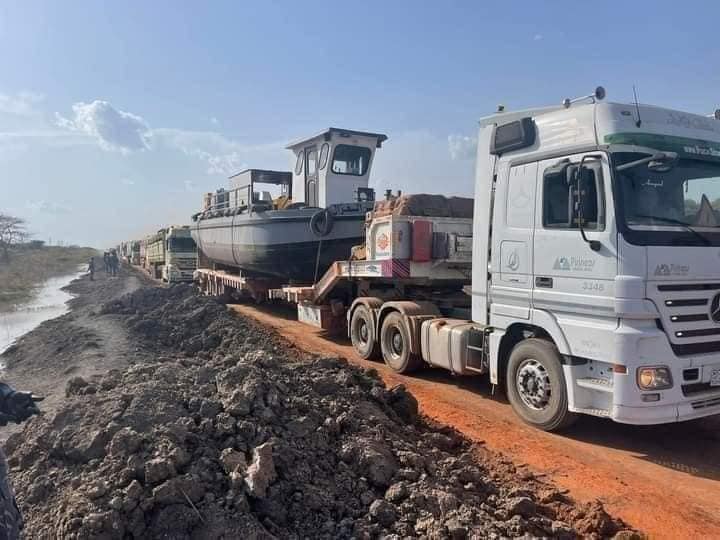
This photo shows some heavy trucks transporting Egyptian dredging machines arriving at Sudan-South Sudan border of Unity state - Courtesy
The government has not approved the controversial initiative to dredge the Nile tributaries, including the acquisition of the Nile River dredging machines from Egypt, the office of President has said.
The reaction comes after some experts and members of the public have criticized the importation of the equipment.
They were delivered by the Egyptian government and received by the Minister of Water Resource and Irrigation, Manawa Peter in March.
At the weekend, Unity State Information Minister, David Gai, confirmed the machines arrived in the state – a move some experts have opposed.
For instance, the Vice-Chancellor of the University of Juba posted on his official Facebook page, calling for 10,000 signatures to be submitted to President Kiir.
He made the appeal to academics, civil society, concerned citizens, and students, among others.
This, he said, is to stop the initiative to dredge the Nile tributaries.
When contacted on the matter, the press secretary in office of the President Ateny Wek Ateny says, Salva Kiir was never informed about the machines.
“The government has not given any approval yet on clearing Nile water or clearing the plants that are inside the Nile. We have not yet been told about those machines completely,” Ateny told Eye Radio Tuesday in Juba.
“The government wanted to know from the experts, the ecological impact of clearing the Nile because their livelihood depends very much on the swamps, that extends to more than thousands square miles,
“South Sudan would want to know if the people who depend on these swamps will be affected.”
Ateny Wek said that the decision to dredge the Nile River was not people-centered, but rather a unilateral one.
For this reason, Ateny said, the government has invited external experts to engage with South Sudanese including intellectuals to arrive at a conclusive decision.
“The government of South Sudan is responsible and always does things after the studies and it cannot do things without study that shows the benefit will not outwit the negative impact,” said Ateny.
“The government of South Sudan has called for experts to come. It will be a people-based discussion, they will have a forum to discuss with academia, discuss with intellectuals, and even civil society organizations,
“Any decision about Nile water will be a collective decision and will not be a unilateral decision by the government.”
Over the years, Egypt has used its extensive diplomatic connections and the colonial-era 1929 and 1959 agreements to successfully prevent the construction of any major infrastructure projects on the tributaries of the Nile.
Support Eye Radio, the first independent radio broadcaster of news, information & entertainment in South Sudan.
Make a monthly or a one off contribution.
Copyright 2024. All rights reserved. Eye Radio is a product of Eye Media Limited.